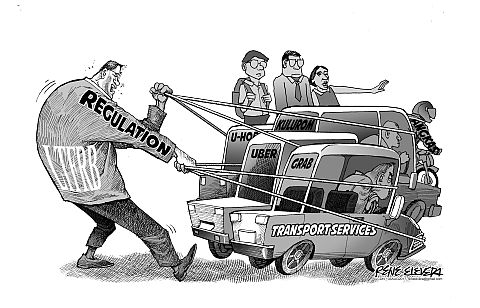
There’s little doubt that Metro Cebu residents need all available transport services in order to survive and make it through the daily traffic grind that had become part and parcel of their urban lives.
Thus, the emergence of Angkas, yet another mobile transport service app that rode on the coattails of the hugely successful Uber and Grab, is being welcomed by residents and Cebu local officials.
Angkas faces some competition from Grab Express, a similar transport service also available on mobile apps and the existing habal-habal (motorcycle-for-hire) drivers who claim to not be affected by their competition at least so far.
Like Uber and Grab, Angkas appeals to commuters through its ease in haling motorcycles without having to wait on the streets for habal-habal drivers who face complaints of overpricing from those who have managed to avail of their service.
The problem lies mostly with existing rules by the Land Transportation Franchising and Regulatory Board (LTFRB) and the Land Transportation Office (LTO) that consider motorcycles for “private use” only.
But like Grab and Uber, public demand will far outweigh the rules no thanks to poor enforcement and the seeming inutility of both transport agencies in going after colorum vehicles that existed long before Uber and Grab first set foot in the country.
Opposition to Uber and Grab — and soon, we expect to Angkas and Grab Express — came mostly from jeepney and taxi operators who see their profits dwindling no thanks to lower consumer demand and the ever persistent fees and requirements from LTO and LTFRB that seem to rise every year.
While infrastructure has not kept up and sadly had even fallen behind these transport service innovations here in the country, existing transport operators are left with little choice but to protest the continued operation of Uber, Grab and other transport services, and they do have a point.
Should taxi and jeepney operators pay much to retain their franchises and comply with requirements while Uber, Grab and other mobile transport service apps either pay less or are exempted from paying the same fees since they also earn?
This and other questions are supposed to be answered by House Bill 6009 or the Transportation Network Service Act proposed by lawmakers, which gives due recognition to these transport network services as an alternative mode of public transport.
Public debate and input should be encouraged and fully mobilized in relation to this proposed bill in order to get the best inputs including those from the existing mass transport groups.
What is clear is that public interest and welfare should be paramount in crafting this proposed law and that the inclusion of these alternative modes of transport won’t hinder but in fact rationalize the government’s efforts and mandate to rationalize and institute a responsive and effective mass transport system.
Disclaimer: The comments uploaded on this site do not necessarily represent or reflect the views of management and owner of Cebudailynews. We reserve the right to exclude comments that we deem to be inconsistent with our editorial standards.




